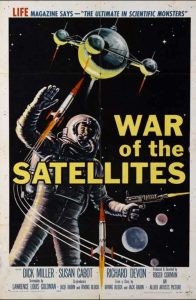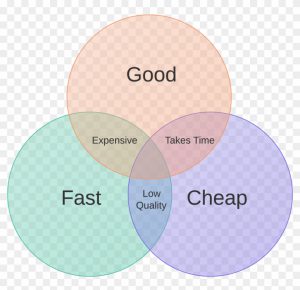 War of the Satellites (1958) by #RogerCorman
War of the Satellites (1958) by #RogerCorman
w/#DickMiller #SusanCabot #RichardDevon
An `unknown force’ declares war on Earth when the UN ignores warnings to stop attempting to send a satellite into deep space.
”We’re up against a race of beings whose intelligence is as ours to ants and bacteria.”
#Horror #SciFi
#NotQuiteClassicCinema
#FridayNightAtTheHomeDriveIn
War of the Satellites (1958) was apparently made in response to the media frenzy that was created by the launch of the U.S.S.R.’s Sputnik satellite – which was, in fact, the first satellite sent into outer space. The movie was made very quickly. It reportedly only took eight weeks to go from first thinking up the idea to screening the finished movie in theatres. This seems a little hard to believe, until you remember that War of the Satellites was produced and directed by Roger Corman. Not only did the man make great movies, he made them cheap and fast.
 That’s not really supposed to be possible. There an old adage, or maxim that says “Fast, Cheap, Good – Pick Two.” Something that’s fast and good won’t be cheap. Something that’s fast and cheap won’t be good. Something that’s good and cheap won’t be fast. This seems to be a pretty accurate summation of work, art, life – whatever. But when it comes to low budget independent filmmaking – particularly genre filmmaking – Roger Corman seems to have found a way to achieve all three.
That’s not really supposed to be possible. There an old adage, or maxim that says “Fast, Cheap, Good – Pick Two.” Something that’s fast and good won’t be cheap. Something that’s fast and cheap won’t be good. Something that’s good and cheap won’t be fast. This seems to be a pretty accurate summation of work, art, life – whatever. But when it comes to low budget independent filmmaking – particularly genre filmmaking – Roger Corman seems to have found a way to achieve all three.
Not everyone would agree with me on this. There are plenty of strange people in the world who don’t think that movies like The Wild Angels (1966), The Masque of the Red Death (1964) and The Little Shop of Horrors (1960) are worthy of serious appreciation. Those with a more open mind and a taste for the more unusual, however, recognize them to be cinematic masterpieces.
The Little Shop of Horrors (1960) was famously shot in two and a half days. It was so much fun that it was turned into a popular Off Broadway musical – which was then turned into a relatively big budget movie musical directed by Frank Oz. Meanwhile, the original movie is still watched and enjoyed by millions of people all over the world.
War of the Satellites is a more serious minded movie, about a disastrous attempt to send the first manned satellite into deep space. Some sort of mysterious force is destroying each and every satellite that Earth sends forth. So far, nine (!) satellites have been blown up when they reach a certain point – and scientists are preparing to send up number ten (?!)
Someone once said that the definition of insanity is doing the same thing over and over and expecting different results. Call me crazy, but I think sending up ten satellites – with human beings inside of them – and watching them explode could be a clear illustration of this point.
One of the leaders of the project, played by Dick Miller, tries to explain:
“Gentlemen, you do not survive by abject surrender. Nations and worlds must fight for survival. If we give in now, let down our defenses, give this alien planet full control over our actions & our lives for mere survival, won’t they decide to take even that away from us? Have the gentlemen here asked themselves why these aliens are so concerned that we do not penetrate the Sigma barrier? Isn’t it peculiar that this action alone excites them to retaliation? They consider us a danger to them if we break out of “quarantine” as they so tactfully put it. They haven’t even bothered to find out whether our motives are peaceful or not. They don’t know that we would collaborate and share knowledge, greet them as equal partners in the universe. But we can’t show them this by surrendering. No, it is precisely because they do not wish us to travel the skies that we must do so. Gentlemen, we must proceed with Project Sigma at all costs.”
Okay…
War of the Satellites (1958) is a good, solid Sci-Fi suspense film. Like Not of This Earth (1957), it’s a perfect example of low budget science fiction filmmaking. Roger Corman once again proves that he’s able to do above average work in less than ideal conditions. It’s not as good as his very best movies, but it’s a whole lot better than many other low budget Sci-Fi movies of its era – or any era, really. It’s #NotQuiteClassicCinema that could brighten up the screen on any #FridayNightAtTheHomeDriveIn.
War of the Satellites (1958) by #RogerCorman
w/#DickMiller #SusanCabot #RichardDevonAn `unknown force' declares war on Earth when the UN ignores warnings to stop attempting to send a satellite into deep space.#Horror #SciFi#NotQuiteClassicCinema pic.twitter.com/0wSZ5Nlktd
— Angus Kohm (@AngusKohm) February 4, 2023
